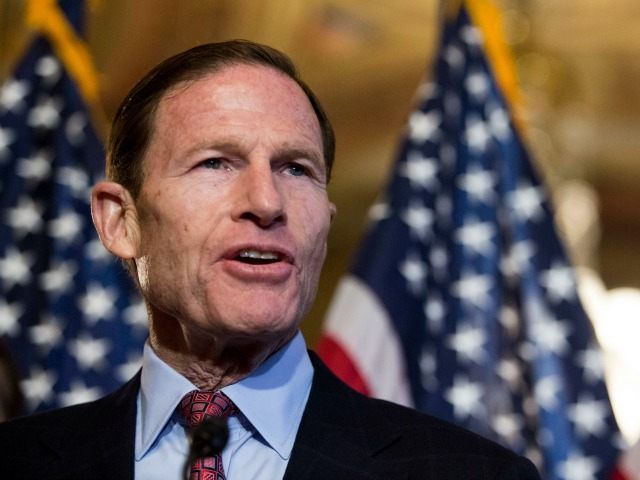Why do men assign themselves starring roles in battles they never even witnessed? Because the rewards for such tall tales remain high and the consequences minimal.
Take Senator Richard Blumenthal, whose prestigious prefix arriving after The New York Times exposed him for making false boasts about serving in Vietnam affirms this truth about liars. His mendacity not only did not preclude him from winning a seat in the United States Senate, it now works as a boomerang against anyone who dares criticize Blumenthal for lying to veterans about his own service. Brian Dennehy lost no roles over propagating a false war record and Brian Williams reads the news on MSNBC despite inventing a story of his helicopter grounded by enemy fire while covering the Iraq war. We incentivize their sin.
Donald Trump calls out the Connecticut Democrat for inventing nonexistent service in Vietnam this week in response to the senator criticizing the president over Russia. It may be a bit of a non sequitur on the president’s part but anyone following his modus operandi knows by now that Trump always counterpunches by bringing up his critic’s most embarrassing moments, however dated or irrelevant.
“Never in U.S. history has anyone lied or defrauded voters like Senator Richard Blumenthal,” Trump tweeted. “He told stories about his Vietnam battles and conquests, how brave he was, and it was all a lie. He cried like a baby and begged for forgiveness like a child. Now he judges collusion?”
A cheapshot? Maybe. Untrue? No.
The senator calls the criticism “slurs.” The media appears to agree.
The Los Angeles Times attacked the president in a headline: “President Trump, Who Got 5 Draft Deferments, Again Attacks Sen. Blumenthal’s Military Record.” The Boston Globe op-ed writer Joan Vennochi’s headline similarly blared, “For Someone Who Never Served, Trump Sure Loves to Criticize Those Who Have.”
Blumenthal, like Trump, received at least five deferments. He served as a Marine reservist from 1970 to 1976 but never went to Vietnam, which, of course, puts no shame in his game if not for the fact that, when he became a politician, he repeatedly insinuated or outright claimed Vietnam veteran status.
Veterans don’t despise civilians who never served. They loathe men who lied that they did.
But exposed stolen valor cases do not become pariahs to the public as they do to veterans. I learned this earlier this year when writing about another Connecticut Marine, historian William Manchester, who, in addition to writing the bestselling nonfiction book of 1967 in The Death of a President, penned a fictitious war memoir called Goodbye, Darkness in which he pawned off fibs as fact.
Along with R. Emmett Tyrrell of the American Spectator, I examined Manchester’s wartime letters to his mom housed at the University of Massachusetts, his papers kept at Wesleyan University, and his 199-page war record obtained from the United States Marine Corps. They clashed with his claims made over several decades, particularly ones in his 1980 memoir Goodbye, Darkness.
Unlike Blumenthal, Manchester did serve in combat (in Okinawa). But he attributed acts of heroism to himself that he never performed and diagnosed himself with war wounds that he never suffered. Manchester did endure a serious shrapnel wound in World War II. But he never got shot in the knee, the head, or the heart as he claimed later in life. He did not win a Navy Cross or a Silver Star or a second Purple Heart as he claimed (Manchester’s papers donated by the popular historian to Wesleyan University contain at least two forged Marine citations). He did not fireman-carry a man off the battlefield after getting shot himself, did not commandeer a machine gun to repel a Japanese advance up an Okinawa hill, and did not flee a field hospital after getting shot to courageously rejoin his unit only to get wounded again. But he did win a $350,000 advance for Goodbye, Darkness and hit #5 on the New York Times bestseller list during Christmas week in 1980.
That’s not quite parlaying a lie into a seat in the U.S. Senate. But it’s a pretty big payoff for a very low move. One suspects, though, more complex reasons found in a deeper, darker place in the psyche than the simple explanation of tall tales told for power or profit.
The media reaction to outlining the contradictions in Manchester’s claims vis-a-vis Manchester’s record came as quite different to what greets Trump. Listen to the crickets at The Los Angeles Times and The Boston Globe. They and other media outlets who spilt much ink on Manchester during his life kept paper dry when news came that he made up so much that his readers believed true about him. They once acted as stenographers repeating the false boasts of William Manchester (read the Times and Globe obits linked above). Now they blast Trump for daring to speak a truth about a man who told a lie. The indecency occurs to them as not when one shouts a fantastic falsehood but when one rebuts it with an unpleasant truth.
“We have learned something important since the days that I served in Vietnam,” Blumenthal told a group of veterans in 2008. Unfortunately, the more we learn about stolen-valor cases, the more we understand why so many make fake boasts. The same newspapers that reprint without question the lies of phony war heroes whitewash revelations of hogwash and bash those who lay bare braggarts.
Stolen valor pays.

COMMENTS
Please let us know if you're having issues with commenting.